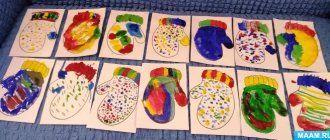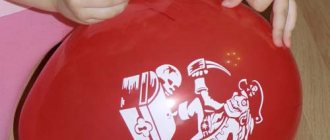In recent days, I have received many questions about our new notes and therefore I decided to tell you more about them. In addition, in this article you will find links to 12 full lesson notes on early development, English, school preparation, entertaining geography, a “science laboratory”, as well as for a children’s art studio and an acting studio.
Notes on developmental activities in English for 4-6 years old
Have you already experienced how difficult it is to find a good English teacher? Even from their student days, beginning “Englishmen” (if they have at least some teaching spark) acquire private practice. They are either not eager to find a job in a children's center, or they are asking for too high a salary.
Another problem is that many young teachers “tutor” quite well, that is, they conduct individual lessons. They are used to starting from the level of one particular student and adapting to him. But they have no idea what to do with a group when they need to hold the attention of several children at once, whose levels may vary slightly. It often turns out like this: a teacher is working with one child, while the rest are bored or, conversely, “standing on their ears.” Even if children are recruited into such groups, they do not stay for long.
Therefore, I organized the creation of notes for beginning English teachers and teachers without experience working in groups.
What can you say about these notes? Our experience in conducting English classes (since 2008) shows that it is very important for parents that classes are conducted not according to an artisanal (as they believe) home-grown methodology created by domestic craftsmen, but according to a respectable British or American method.
On the other hand, a textbook alone is absolutely not enough to conduct 50-minute lessons (as a rule, a textbook lesson is designed for 20-30 minutes). Even with the help of the Teacher's Guide (teacher's manual), the lessons are not rich and interesting enough.
That's why we decided to write notes. The textbook from the respected Longman publishing house – Wonderland Pre-Junior and its CDs were taken as a basis. An experienced teacher-methodologist supplemented it with a detailed description - how the teacher meets children, what games are used when greeting and for “warming up”, what creative and developmental tasks we perform during the lesson, additional vocabulary is given. Along with the notes, you will receive the author's applications for carrying out the exercises. Exercises from the textbook are approximately 10-15% of the lesson.
That is, using notes, you conduct not just English classes, but a comprehensive developmental lesson in English - with exercises for attention, memory, thinking, fine motor skills, with musical pauses and creative work.
This course was compiled by a teacher-methodologist with 13 years of experience working with preschool children. Therefore, the notes provide for situations when children do not want to complete this or that task, when children become bored and what needs to be done to prevent the lesson from being disrupted. In such cases, the teacher has a whole arsenal of games presented in the notes; he can quickly replace the task with another, without giving the slightest opportunity for the children to lose interest in the lesson. Also, notes provide for frequent changes in types of activities, which helps maintain the constant interest of children and prevents them from getting tired of the lesson.
Another advantage of the finished course is its applications. The teacher is freed from searching and constantly copying various books; everything necessary is already included in each lesson. The teacher can only prepare the necessary toys and make games for children from the proposed applications.
I repeat that the lesson taught using these notes is not just an English lesson, but a developmental lesson in English. This can become a competitive advantage that will distinguish your course and your club from competitors.
View an example of a summary in English →
In addition to our notes, for conducting classes you will also need:
- Textbook Wonderland: Pre-Junior: Pupil's Book (preferably for each student)
- One CD of English Adventure Starter A Songs for use in the classroom
- Super Simple Songs.
Types of developmental activities in the preparatory group
The implementation of development tasks according to the guidelines of the Federal State Educational Standard (FSES) accompanies the entire educational process in kindergarten, but is most pronounced when organizing educational activities. The list of disciplines is expanding in comparison with the senior group:
- mathematics (2 times a week);
- speech development (once a week);
- literacy training (once a week);
- physical education (3 times a week, in some kindergartens one of the three classes is allocated for sports games, and separately for boys and girls, for example, pioneer ball and aerobics, respectively);
- familiarization with the outside world (once a week);
- ecology and basic life safety (once a week);
- artistic creativity (drawing 2 times a week, sculpting and appliqué 1 time);
- design (once a week);
- music (2 times a week).
If the kindergarten work program provides for it, then 1–2 hours a week in the work schedule are allocated for choreography (or logorhythmics, rhythmoplasty) and a foreign language (English).
The tasks of the comprehensive development of preschoolers are also included in routine moments, as well as in preparing entertainment and organizing outings, suggesting:
- developing a culture of hygiene skills in the aspect of self-care, following the rules of a healthy lifestyle;
- accumulation of experience in the emotional-volitional sphere;
- development of intelligence, independence;
- continuation of work on the formation of moral qualities of the individual and a sense of patriotism.
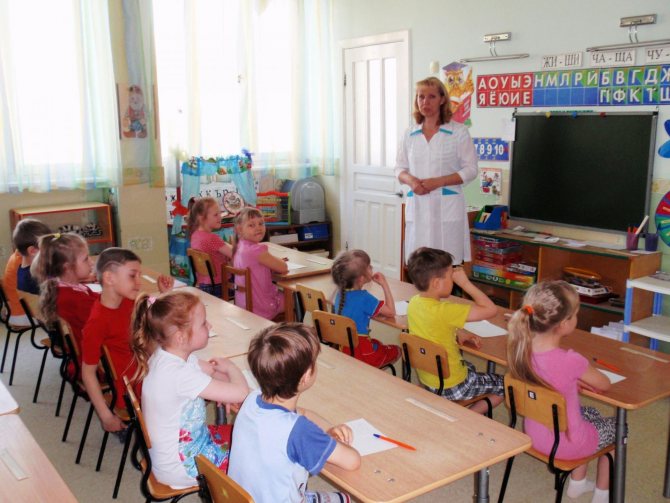
There is a developmental component in every element of educational activity in a preschool educational institution.
Acting notes
Many of us know how shyness and lack of self-confidence can bring internal suffering and objectively interfere with success in school, in a career, in communicating with friends and in our personal lives.
Achievements in study and work largely depend on the ability to present oneself in a favorable light, win over interlocutors, speak clearly and expressively, and speak in front of a large audience.
And in relationships with loved ones and friends, it is very important to be able to listen and hear, to convey your thoughts and emotions.
Children learn all this in the theater studio. These activities help children “open up”, live in harmony with themselves and be happy.
An example of a summary here →
Notes on preparing for school for ages 6-7 years for reading children
The second year of teaching children under the “Preparing for School” program is designed for children who came to your classes at the age of 5-6 years, and are now ready to continue their education at another level of preparation for school, age 6-7 years.
Practice shows that at this stage of education new children will definitely appear who have already reached the age of 6-7 years and want to attend a school preparation course in your children's club. Many of them may not be able to read and have minimal knowledge of mathematics.
When planning classes, this fact must be taken into account, because all children will have to study together, in one group. As our teachers note, this has benefits for everyone, both new children and those who already attended your classes last year. New children acquire new knowledge and learning skills, while “old” children consolidate and improve their skills.
This year, a lot of work is planned on the phonetic side of the Russian language, much attention is paid to sound-letter analysis and synthesis. Children learn to distinguish vowel sounds from consonants, to give a detailed description of sounds ([z] - consonant, paired hard (soft), paired voiced; [a] - vowel, unstressed (stressed)).
Such concepts as stress, stressed-unstressed syllable are introduced. The ability to determine the number of syllables by the number of vowels is being developed. The simplest concepts of parts of speech are given, work is being done on sentences, the ability to compose stories from pictures, and retelling.
To strengthen reading skills, it is recommended to read short texts and stories, with mandatory analysis of reading comprehension, answers to questions and retellings.
In the “Mathematics” course, work continues on the numbers of the first ten, the ability to write numbers and mathematical signs is consolidated, the skills of oral and written calculations are improved, the composition of numbers, comparisons of numbers, the ability to solve problems and write down its solution are worked out, the structure of the problem is worked out, work is underway on geometric material, tasks for the development of logic and thinking are selected.
Children get acquainted with the formation of numbers of the second ten, Roman numerals. The concepts of kilogram, gram, centimeter, the concept of angles, etc. are introduced. The skills to draw and measure segments, the ability to distinguish them from a straight line, a ray are formed.
IMPORTANT! One more organizational point. Some clubs for the “School Preparation” course prefer to use handout sheets printed on the club printer. Others use ready-made textbooks and copybooks. We belong to the latter group, since we considered that printing black and white sheets, and even more so color pictures, in the club throughout the year is much more expensive than a one-time purchase of copybooks. However, work is now underway to draw special worksheets for these notes. And when this work is completed, we will offer all owners of the notes and our illustrations. You will be able to choose whether to work according to the instructions we provide or print out handout sheets developed by our methodologists for each lesson.
View an example of a school preparation plan for 6-7 years old →
Mission of development classes in the preparatory group
Before talking about the goals and objectives of developmental activities with children 6–7 years old, it is necessary to decide what an activity is. In the methodological literature, this term is understood as an element of the educational process organized by structure and time, designed to solve its specific goals and objectives. Classes are direct educational activities (DEA), which are characterized by three areas of goal formulation: teaching, educational and developmental. Thus, any activity is developmental.
Continuing the work strategy begun in the senior group, the goals of such lessons in the preparatory group are:
- consolidation of skills that characterize the norms of age-related development of children 6–7 years old (concentrate on completing a task, be able to anticipate the results of completing a task, etc.);
- bringing the conditions of interaction in the GCD process as close as possible to a lesson at school (strict adherence to the rules, for example, to answer or ask, you need to raise your hand, increasing the duration of the lesson to 30–35 minutes);
- nurturing the spirit of collectivism (in classes, preference is given to group forms of work).
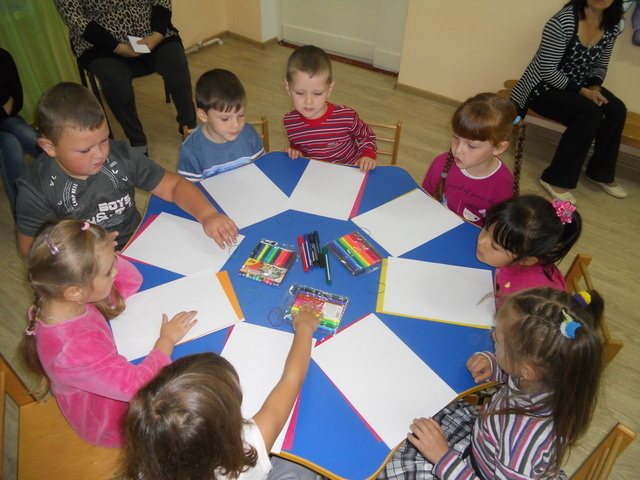
In developmental classes, children continue to learn to work together
Objectives of developmental classes in the preparatory group
The implementation of lesson goals is possible subject to the consistent solution of educational tasks, which are determined by the general level of development of preschool children 6–7 years old in the areas of intellectual, physical and mental development.
Table: objectives of developmental classes by educational area
| Region | Features of development | Objectives of developmental classes |
| Cognition |
|
|
| Social and communicative development |
|
|
| Physical development |
|
|
| Speech development |
|
|
| Artistic and creative development |
|
|
This is interesting. The teacher, building work with the parents of pupils, orients mothers and fathers to the designated development tasks, which makes it possible to implement the principle of continuity between the kindergarten and the family in the educational process.
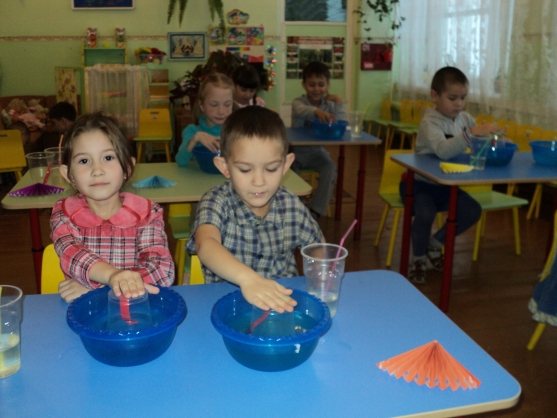
Practical development of life is an important task of developmental classes
Free notes for classes with children in various areas
- Abstract on early development for ages 1-1.5 years
- Abstract on early development for ages 1.5-2 years
- Abstract on early development for ages 2-3 years
- Summary of comprehensive development for ages 3-4 years
- Summary of comprehensive development for ages 4-5 years
- Notes on preparing for school for ages 5-6 years
- Notes on preparing for school for ages 6-7 years
- English language notes for ages 4-6 years
- Abstract on entertaining geography for ages 4-7 years
- Notes on the course “Scientific Laboratory” for ages 5-7 years
- Drawing notes for ages 5-7 years
- Notes for an art studio (batik, iso-modeling, floristry - paper flowers, decoupage, sand painting, cardboard modeling) for ages 4-6 years
- Notes for classes in an acting studio for ages 3-6 years
If you liked any of these notes, you can purchase a complete set from us for the course that interests you.
Algorithm for compiling lesson notes
The lesson notes are the “skeleton”, the basis of interaction with children. Its compilation must be approached with special care, and this concerns not only the content, that is, methods and techniques in work, but also the form - the sequence of stages and the formulation of goals and objectives.
Table: structure of a summary of a developmental lesson in the preparatory group
| Composition element | Sample |
| Lesson topic, educational course, educational area. | “Journey to the Islands of Knowledge”, FEMP, “Cognition”. |
| Place of the lesson in the lesson system | Final lesson |
| Name of the group and age of the children Full name of the teacher indicating position and regalia | |
| Target Component | Identification of knowledge, abilities, skills of pupils of the preparatory group for school over the past period of the school year. |
| List of tasks | Training tasks:
|
Developmental tasks:
| |
Educational tasks:
| |
| Lesson content | A statement of the order and content of each stage of the lesson. |
Table: Shirshikova I.V. summary of a lesson on speech development on the topic “Retelling the fairy tale “The Fox and the Goat” in the preparatory group (fragments)
| Stage | Content |
| Organizational | The teacher asks a riddle: “The tail is fluffy, the fur is golden - who is the riddle about?” (About the fox.) |
| Shows the children several pictures of a fox: “When you were in the older group, you and I looked at different pictures. Now you can take any picture and say what kind of fox you have. If one has a red fox, then another has another... someone has a beautiful fox, and someone else..." | |
| Basic | The teacher expressively tells the fairy tale “The Fox and the Goat.” Asks questions: “What is this fairy tale about?”; “How does it start? Is it ending?"; “How is the Fox shown in the fairy tale? Why do you think she's cunning? How else is the Fox depicted?”; “What is the Goat in the fairy tale? Why do you think he is like that?"; “Which words and expressions did you like best?” |
| “Listen to the story again,” the teacher suggests, “then you will tell it.” Listen carefully and remember. 3-4 retellings are heard. You can invite the children to retell the fairy tale in roles (or as a group - “team”). Children evaluate their comrades' retellings. If they find it difficult, the teacher does it himself, drawing their attention to the completeness of the content, the expressiveness of intonation in the dialogue, the use of figurative words and expressions from the text. | |
| The teacher addresses the children: “You told the story interestingly and expressively.” Let's think again about what the Goat was like. What words can you use to describe him? (Slow-witted, stupid, unintelligent, inattentive, etc.) - What was the fox like? (Red-haired, cunning, beautiful, smart, dexterous, fast, nimble.) - What words that you said about the goat and the fox can be used when talking about a person? - What kind of well was it? (Deep, cold, dark, muddy, dirty, narrow)…> | |
| Material fixing stage | <... - Listen carefully and answer. Cold, deep, transparent - is it a river or a stream?.. Blue, glass, fragile - is it a saucer or a cup? When conducting these exercises, the teacher makes sure that the children clearly pronounce endings and correctly agree adjectives with nouns. The teacher suggests learning a tongue twister about a fox: “The fox runs along the six. Lick the fox, the sand.” The teacher and then the children pronounce the tongue twister loudly, moderately, quietly, in a whisper...> |
| The final stage | <… Summing up and reflection. |
Table: Tyablina I.N. summary of a lesson on FEMP on the topic “Journey to the land of fairy-tale heroes” in the preparatory group (fragments)
| Stage | Content |
| Organizational | Educator: Guys, I see that you are smiling, which means you are in a good mood. Now look at our guests, give them a smile and say hello. Well done! All the children gathered in a circle, I am your friend, and you are my friend, Let's hold hands tightly and smile at each other. |
| Educator: Today, when I came to kindergarten, I saw on the table this telegram from the Fairy from the country of “Fairytale Heroes”. Let's read it: “Dear guys, we, the heroes of a fairyland, are in trouble. Baba Yaga mixed up the fairy tales, kidnapped the main characters and cast a spell on them. Only you can help us. If you complete all the tasks and guess these heroes, they will return to fairyland and their fairy tales. Dear children, help us." | |
| — Do you want to help fairy-tale heroes? Children: Yes Educator: Then let's prepare for the trip and do a mental warm-up. Educator: Guys, in order to answer correctly, you need to listen carefully. (The teacher passes the ball to the children, whoever has it in their hands answers the question) Game “All Year Round”: What time of year is it now? (Winter), Name the neighbors of winter. (Autumn, spring)…> | |
| Basic | <... Educator: - Guys, let's try to write a mathematical dictation and find out what we are going on a trip with. Go to your seats. Open your notebooks, take your pencils. Listen to me carefully. Are you ready?…> |
| <...Educator: - What did we do? Children: - Airplane! (they depict an airplane flying to the music)…> | |
| <...Educator: - So, the first task from Baba Yaga: counting from a given number to 10; count down from 10 to 0; name a number that is greater than 4 but less than 6; name a number that is greater than 5 but less than 7; name the numbers in the row to the right of 5...> | |
| <… Educator: To save Little Red Riding Hood we must complete Baba Yaga’s next task. Task with geometric shapes. Educator: I’ll show you cards with geometric shapes, and you name the extra shape. (Children name the extra figure and explain their choice)…> | |
| Educator: Guys, now it’s time to go back to kindergarten. Tell me, how do we learn about time? Children: Using a clock. Educator: What types of watches do you know? Children: Sand, solar, water, electronic, mechanical. Educator: What time does our mechanical clock show? …> | |
| The final stage | <... - Our journey has come to an end. Did you guys enjoy traveling? What fairy-tale heroes did we help? What new did you learn? |
| Educator: - You were persistent, attentive, quick-witted, and for this the Fairy thanks you and gives you this smiling sun. - Now show me what mood you are in. “I’m also in a good mood because you know a lot and are such great guys!” |
